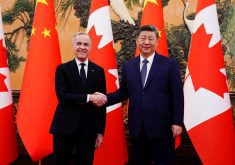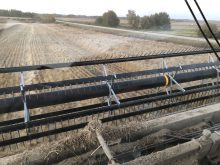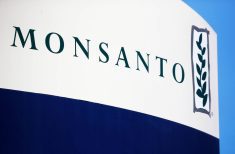Canada’s cattle sectors aren’t the only ones up in arms about U.K. acceptance into the Comprehensive and Progressive Agreement for Trans-Pacific Partnership.
On Feb. 12, the pork industry also weighed in. It is vehemently against the idea of British participation in a trade agreement that, so far, has been pretty good to Canada’s meat-producing sectors. It has joined forces with two cattle industry groups and the Canadian Meat Council to say so.
The “Say No to a Bad Deal” coalition argues that the U.K.’s attitude toward trade with Canada is unco-operative and that the country “is not interested in free and fair trade in agricultural products,” said a press release announcing the Canadian Pork Council’s participation in the coalition.
Read Also

Spoken questions are what make it an interview
Recently, I was exchanging emails with the media email account at a government agency, hoping to reach a source for…
“We have been patient and proposed solutions to safeguard the interests of Canadian farmers and ranchers, yet our concerns remain unaddressed,” CPC chair René Roy said. “Setting a precedent for non-tariff trade barriers within the CPTPP must be avoided to protect our industry.
“Great Britain’s refusal to truly engage Canada in the current negotiations poses significant risks to Canada’s agricultural sector, and it is crucial we address these concerns head-on before the U.K. joins a trade deal of which we are a founding member.”
It’s a striking stance, considering the policy history of the coalition’s member organizations, all of which are steadfastly pro-trade in their export-reliant sectors.
For those familiar with the results of recent European trade agreements for those sectors, it’s less surprising. The regulatory issues that stymied promised gains for Canadian pork and beef under CETA (the Comprehensive Economic and Trade Agreement between Canada and the EU) are still very much in force and, Brexit or no Brexit, a lot of the same issues are lurking in trade talks with the U.K.
As a quick refresher, CETA’s issues involve regulatory barriers that, despite promises on paper for greater market access, did not allow Canadian products to break into the market.
Beef and pork promised to be big winners when CETA took provisional effect in 2017. The beef sector was told to expect up to $600 million a year worth of increased exports. The pork industry was told its gains would run up to $400 million a year.
Five years later, an article from the Alberta Farmer Express looking back at the deal showed the purported benefits were far short of those goals. In 2021, the cattle sector sold only 1,450 tonnes of beef (worth about $23.7 million) to the EU, while European producers sent about 17 times that amount of beef the other way.
“I guess what it shows is that in a trade agreement, the act is one thing, but the carrying out of it is another thing,” the Canadian Cattle Association’s Bob Lowe was quoted in the article as saying.
Carcass washes were, and remain, a main irritant. Canada uses peroxyacetic acid as a food safety measure, but that product is not approved in either the U.K. or EU. The Canadian meat sector has characterized the disparity (which has not been resolved despite years of advocacy and work with European regulators) as a non-tariff barrier that contradicts the spirit of the trade agreement.
The wash was under review by the European Food Safety Authority last year. As of October 2023, Global Affairs Canada noted the EFSA had 12 months to finalize its decision and added that Canada “remains hopeful of a favourable result.”
It makes sense that a group of industries already bitten, who now sees the same issues on the horizon, is loath to show up for another round.
It’s not clear how much traction their arguments will get with Ottawa. When the coalition launched last fall, the Canadian Cattle Association’s John Masswohl noted lacklustre federal response.
Last July, Canadian trade minister Mary Ng made no mention of the issue when she welcomed the U.K. into the CPTPP. Instead, she touted Canada’s early support of the U.K.’s ascension and cited a shared dedication to “open, predictable and inclusive rules-based trade.”
I can think of a few industries that would disagree.
















